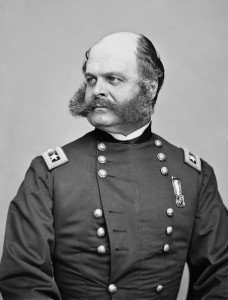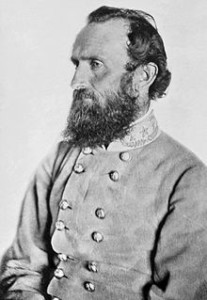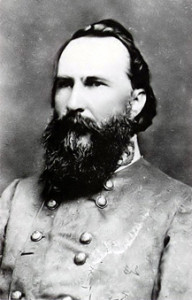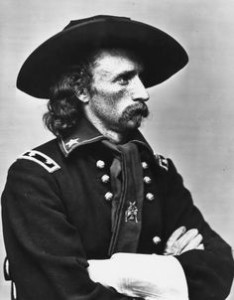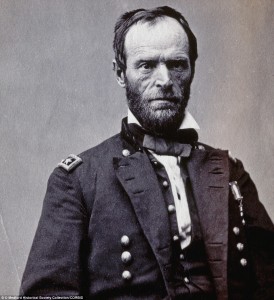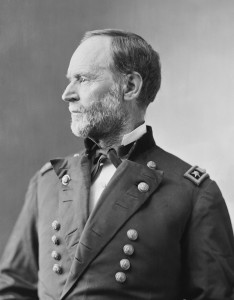Saw a cop show the other night where there was a lot of talk about following a hunch, or more colloquially, your gut. Then by accident I was reminded today of the most extraordinary statement ever made in American politics. “If nominated I will not run. If elected I will not serve.”
His name was William Tecumseh Sherman. He is still hated today in the south, more than even Lincoln, because he was, in the words of British military historian B. H. Liddell Hart, “the first modern general.”
Long before I studied the Civil War I looked at pictures of it in my Grandpa Miesse’s books. He was a student of the war, had all the books, and knew all the battles inside out. Most of the pictures of generals looked pretty much the same to me, stiffly posed super-confident men with an abundance of beards, mustaches, and side whiskers. Only one looked out of place. His name was William Tecumseh Sherman.
I mean, you couldn’t walk down the street in Salem today and see General Ambrose Burnside, Robert E. Lee, Stonewall Jackson, George McClellan, James Longstreet, Ulysses Grant, or George Custer.
See what I mean? Thing is, you could walk down the street in Salem and see a man who looks like this.
Okay, okay, I can hear you thinking So what. He’s a little more fashion forward, a little less vain, a little less cocooned in the Christian certainty of the age, a little more, uh, modern in affect. So what, right?
But there’s this from the Wiki entry on Sherman.
“Sherman was born in 1820 in Lancaster, Ohio, near the banks of the Hocking River. His father Charles Robert Sherman, a successful lawyer who sat on the Ohio Supreme Court, died unexpectedly in 1829. He left his widow, Mary Hoyt Sherman, with eleven children and no inheritance. After his father’s death, the nine-year-old Sherman was raised by a Lancaster neighbor and family friend, attorney Thomas Ewing, Sr., a prominent member of the Whig Party who served as senator from Ohio and as the first Secretary of the Interior. Sherman was distantly related to American founding father Roger Sherman and grew to admire him.
“Sherman’s older brother Charles Taylor Sherman became a federal judge. One of his younger brothers, John Sherman, served as a U.S. senator and Cabinet secretary. Another younger brother, Hoyt Sherman, was a successful banker. Two of his foster brothers served as major generals in the Union Army during the Civil War: Hugh Boyle Ewing, later an ambassador and author, and Thomas Ewing, Jr., who would serve as defense attorney in the military trials of the Lincoln conspirators. Sherman would marry his foster sister, Eleanor, at age 30 and have eight children with her.”
All of which is true except for the part about William Tecumseh Sherman. My own family, on my mother’s side, were all from Lancaster, Ohio. My grandfather spent his career working for Anchor Hocking Glass, first in Lancaster and then in Salem, NJ. Their parents and grandparents knew the Shermans. Lancaster was a small town. (Still is. I’ve been there.) There was no son named William.
But the Methodist church records show that there was a great great grandson named William, who disappeared sometime in 1945, shortly after his military service in World War II.
I once asked my grandpa about General Sherman. Lancaster and all that. He brushed it aside. “A mistake is all,” he said. “The Shermans weren’t the ones had the general. Some other folks in some other town maybe.”
Yeah, I know it’s a slender thread. But what if? What if we lost World War II because we were a divided nation, two or more separate countries, and William Tecumseh Sherman figured out a way to go back and apply the lessons of Total War against the Confederacy?
A closing note. I went to a prep school about a half day’s drive from Lancaster. There was one old decent hotel/restaurant. It was called The Tecumseh Inn. Founded in 1938.
Again, from a wiki, things still contested…
“Sherman’s unusual given name has always attracted considerable attention.[5] Sherman reported that his middle name came from his father having “caught a fancy for the great chief of the Shawnees, ‘Tecumseh.'”[6] Since an account in a 1932 biography about Sherman, it has often been reported that, as an infant, Sherman was named simply Tecumseh. According to these accounts, Sherman only acquired the name “William” at age nine or ten, after being taken into the Ewing household. His foster mother, Maria Willis Boyle (Maria Ewing), was of Irish ancestry and a devout Roman Catholic. Sherman was raised in a Roman Catholic household, though he later left the church, citing the effect of the Civil War on his religious views. According to a story that may be myth, Sherman was baptized in the Ewing home by a Dominican priest, who named him William for the saint’s day: possibly June 25, the feast day of Saint William of Montevergine.[7] The story is contested, however. Sherman wrote in his Memoirs that his father named him William Tecumseh; Sherman was baptized by a Presbyterian minister as an infant and given the name William at that time.[8] As an adult, Sherman signed all his correspondence – including to his wife – “W.T. Sherman.”[9] His friends and family always called him “Cump.”
You see? Or not.


